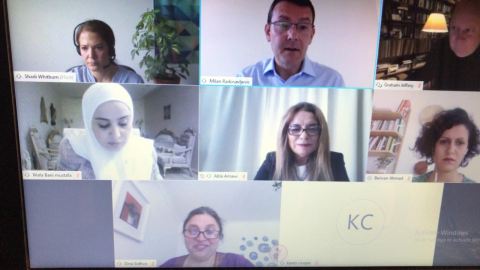

HPC, in cooperation with the Centre for Women in Protracted Crisis (at the University of the West of Scotland) and the Global Refugee Health Research Network (GRHRN at the University of Edinburgh), held a virtual seminar entitled “Endangered Lives: the interlink between Fragility and Gender in the Global South” on Tuesday attended by participants from 12 countries across the globe: Scotland, Jordan, India, Bangladesh, Uganda, Italy, Greece, Germany, Austria, Singapore, South Africa and the United States. The webinar offered an opportunity to look into the special situation of refugee women in fragile contexts and the challenges facing them from a gender perspective.
HPC Secretary General, Dr. Abla Amawi, said in her presentation on “Endangered Lives: the Interlink between Fragility and Gender in the Global South”: “we are now witnessing the highest levels of displacement on record. An unprecedented 79.5 million people around the world have been forced from home as of 2019, including 26 million refugees, 45.7 million internally displaced persons and 4.2 million asylum seekers as per UNHCR statistics”. Amawi noted that the countries that host the highest number of refugees are Turkey (3.6 million), Columbia (1.8 million), Pakistan (1.4 million), Uganda (1.4 million) and Germany (1.1 million), whereas the highest refugee producing countries are Syria, Venezuela, Afghanistan, South Sudan and Myanmar. Amawi stressed that countries that host record numbers of refugees require support and solidarity to deal with the far-reaching impact of Covid-19 on economics and stability in the region where women and girls face heightened risks due to displacement and the breakdown of normal protection structures and support.
During the session, Amawi gave a historical overview of refugees in Jordan, the key international laws and instruments concerning refugees and the international rights of refugees. Amawi noted that refugees have the right not to be forcibly returned to countries where they risk being persecuted, the right to receive assistance, on the long term, in finding solutions either through the voluntary return back home, integration into the country of asylum, or resettlement in a third country, and the right to access basic services. Including education, primary healthcare, maternal and child health services, psychological health support and decent livelihood.
Amawi indicated that HPC is an active member of the Global Refugee Health Research Network (GRHRN), which was established in 2019 at the University of Edinburgh, in collaboration with the University of the West of Scotland, as a response to the need to address serious health consequences for people displaced due to war, poverty, political instability, human-rights violations and environmental factors. GRHRN brings together academics, policy makers and practitioners from across the world to address the health needs of refugees, through research and policy development and turning policy into implementable practices. The newly developed Centre for Women in Protracted Crisis at the University of the West of Scotland emanated from the global challenges research (funded by the Scottish Funding Council) undertaken by the University of the West of Scotland and focuses on the challenges faced by women experiencing protracted displacement.
Amawi noted that HPC is currently working on three important research projects that look at refugee women and girls through the lens of gender, and the heightened impact of the Corona virus on the lives of already vulnerable refugee women due to the lack of financial resources and their inability to secure basic needs, with colleagues from the University of Edinburgh- Dr George Palattiyil and the University of the West of Scotland-Dr Dina Sidhva; who are also the co-conveners of GRHRN..
Her Excellency Wafa Bani Mustafa, member of the Jordanian Parliament and chairperson of the Coalition of Women MPs from Arab Countries to Combat Violence against Women, explained in her presentation on “Political Violence Against Women” that according to the Inter-Parliamentary Union, 44% of women parliamentarians in the world receive death and rape threats, and that women who call for legislative amendments to advance women’s rights become the target of defamation campaigns. Ms. Bani Mustafa stressed the need for UN member states to develop international agreements to combat political violence against women, allocate budget resources to enhance the political participation of women, and set up an international fund to support women in specific situations.
Bani Mustafa further noted that the Coalition of Women MPs from Arab Countries to Combat Violence against Women will soon release a manual on violence against women in politics, which provides a definition of political violence and identifies the characteristics of violence against women in the political and public arena as well as the forms and impact of political violence and the precautionary measures to prevent it.
The event also hosted Berivan Ahmad, a Syrian refugee, who shared her personal story as a refugee moving from Syria to Lebanon, Turkey, Greece and Germany. She also talked about the plight of refugee women due to the lack of moral support networks that would help them rebuild their lives in the asylum countries.
The newly developed Centre for Women in Protracted Crisis at the University of the West of Scotland emanated from the global challenges research undertaken by the University and focuses on the challenges faced by women experiencing protracted displacement.







